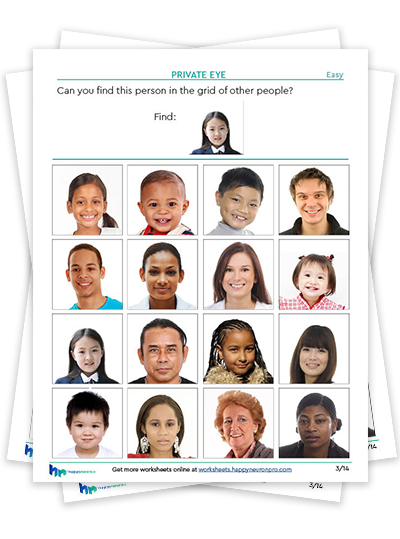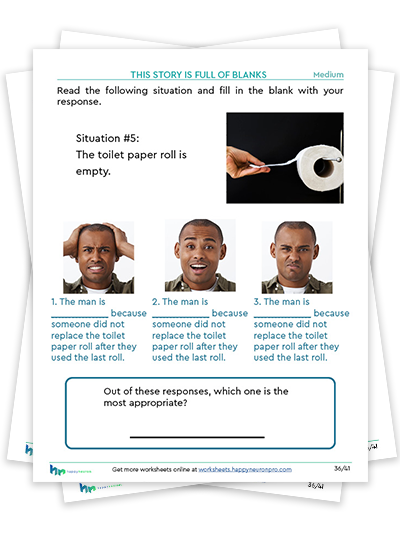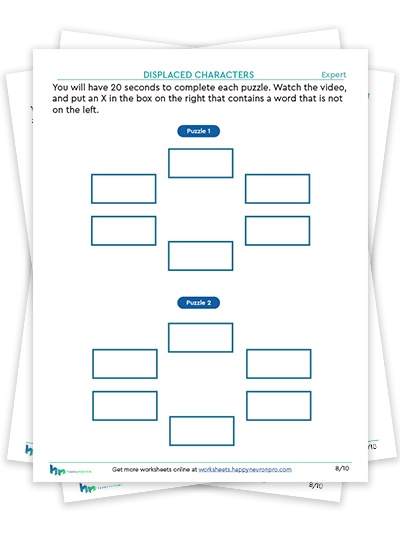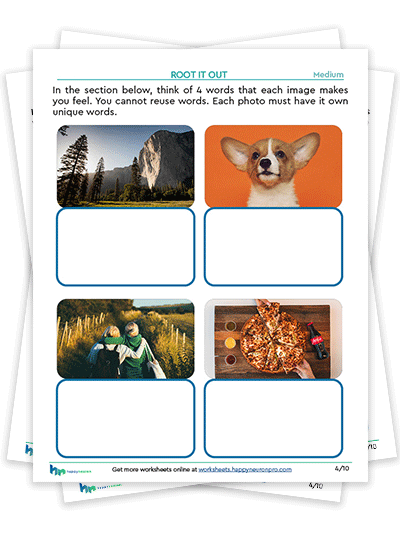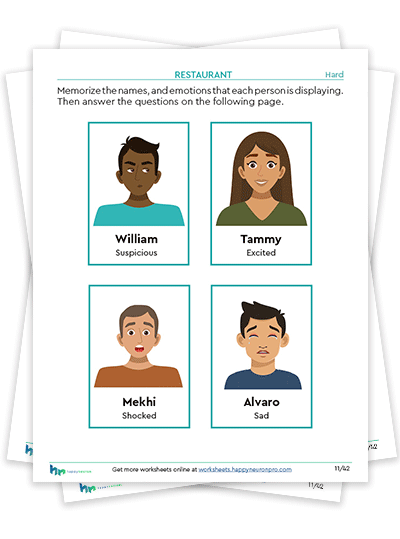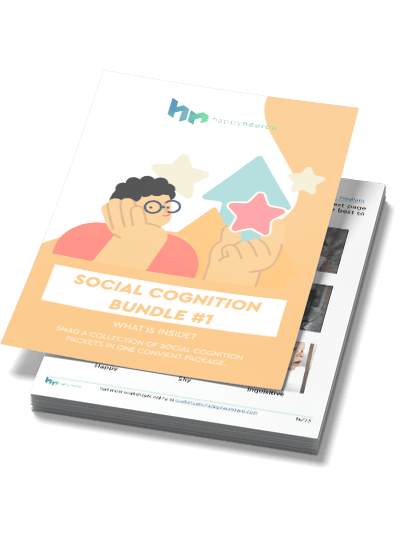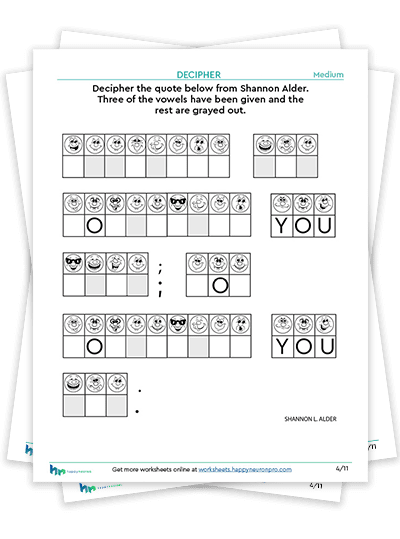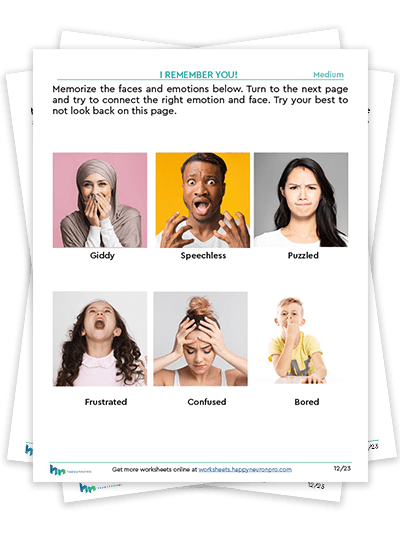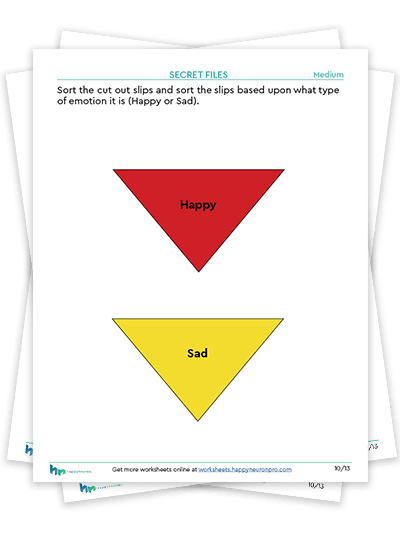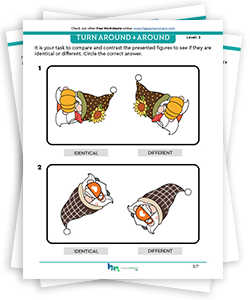Social Cognition Worksheets
Social Cognition Worksheets
Explore our social cognition inspired worksheets
We have packets, mini packets or bundles that focused on social cognition. Join our newsletter and get free packets directly in your inbox 2x a month.

Filters
Kids
Hybrid
Themed
Not purchased yet
Sort by
Exercise your social cognition skills with this bridging packet! Centered around the theme of remembering individuals at a conference, this packet offers a comprehensive approach to improving your ability to navigate social interactions and professional networking. Drawing from a variety of effective exercises, this social cognition workbook provides a fun and practical way to work on social and cognitive abilities.
Exercises:
I Remember You: Focus on remembering names, faces, and personal details about individuals, which is crucial for building social connections and professional relationships.
Pay Attention: Exercise your ability to concentrate on specific tasks and retain information over short periods.
Seize the Keywords: Encourages you to memorize key elements of a text and recall them accurately, a skill useful in remembering important details from conversations.
This Story is Full of Blanks: Challenges you to fill in missing words in a text using context clues, working on your ability to understand and remember conversations.
This packet is great for professionals who are looking to re-enter work after an injury, or students looking to enhance their social cognition skills.
Challenge your social cognition and memory with our conference-themed cognitive exercise bridging packet. Combining the best of multiple exercises, this packet provides a practical and engaging way to work on your ability to remember names and faces, stay focused, and communicate effectively.
If you like this workbook, make sure to check out our other bridging workbooks today! →
Included inside: 25 activity pages
Disclaimer: Results vary based on individual effort and cognitive health.
Are you a geography enthusiast? Challenge yourself with our exciting verbal and visual memory worksheets that test your knowledge of flags from around the world! This unique twist on our popular visual and verbal memory game, “I Remember You,” offers a fun and educational way to exercise your cognition.
This mini packet is crafted to help you work on your capacity to recall words and images associated with each other – a fundamental skill for remembering names and faces. By engaging with colorful and distinct national flags, you’ll train your brain to form stronger associations between visual cues and verbal information.
Perfect for both kids and adults, this exercise provides an enjoyable yet stimulating way to exercise your memory skills. Whether your client is a student putting their memory and geography skills to the test, or an adult looking to strengthen memory abilities after an injury, this packet offers a rewarding mental workout.
Embark on a journey of worldly knowledge and cognitive enhancement. Strengthen your recall abilities and expand your geographical knowledge, all while having fun with this innovative memory game!
Included inside: 14 pages of verbal and visual memory worksheets, and bridging questions
If you like this mini, make sure to check out our other memory worksheets today! →
Elevate your visual memory and refine your facial recognition abilities with our Matching Faces Packet. This comprehensive collection is expertly designed to be an engaging visual memory exercise, offering an enjoyable challenge for individuals of all ages.
Key Features:
- Matching Faces for Visual Memory Mastery:
- Immerse yourself in the captivating world of facial recognition by mastering the art of matching faces within this thoughtfully crafted packet.
- Strengthen your visual memory as you train your mind to identify and remember unique facial features.
- Versatile for All Ages:
- Suitable for a diverse audience, from children honing essential cognitive skills to adults looking to sharpen their memory prowess through the art of matching faces.
- In fact, this is ideal for clinicians, parents, educators, and individuals seeking an enjoyable yet impactful visual memory challenge.
What’s Included in Our Matching Faces Worksheets:
- The Right Person in a Crowd: Hone your ability to find a face in a crowd by trying to locate the target person in a grid of people. Private Eye has a fun social cognition element and is a great way to warm up your cognitive abilities.
- Remembering your Friend: Immerse your client in this visual memory task as they have to find all of the matches of faces from memory. This printed version of Gulf Stream shows how practicing the digital exercise may help your client’s visual memory skills.
- Order’s Up: Another life skill experience has entered the pages of this workbook. The restaurant again has a human factor to it! We hope your client starts to see the real-life bridging between the digital tool and real life.
- Bird Song: Lastly, dive into your auditory memory box as your clients listen to conversations and answer questions..
Included inside: 40 visual & social memory activities and bridging questions.
In fact, if you like this packet, explore our other social cognition worksheets →
Are you looking for worksheets to be used in your identifying emotions activities? Then look no further! We’ve adapted our digital exercises to help you strengthen your client’s ability to identify and express emotions. Key features of this packet are:
- Emotion Recognition: Practice recognizing emotions at a glance. We’ve adapted our digital exercise, Ancient Writing, to use modern emotion-based emojis instead. Your client will have to read the emotions and identify which one does not belong.
- Expressive Vocabulary Building: This packet encourages exploring and incorporating diverse emotional words. Whether you’re seeking to expand your vocabulary or assist others in doing so, these exercises provide an enjoyable pathway. I Remember You is now into I Understand Your Emotions.
- Working Memory Recall: Can you recall the faces of different emotions at a moment’s notice? In contrast to typical n-back exercises, this packet has a series of emojis instead of colors or letters. This exercise would work great in this packet or on its own as a warm-up.
- Situational Response Practice: Elevate your client’s interpersonal interactions with informed emotional responses! Your client will have to engage in scenario-based activities that encourage thoughtful consideration of appropriate reactions to different emotional situations. Start to develop the ability to navigate conversations and relationships with empathy and grace.
Dive into the world of emotional vocabulary, recognition, memory reinforcement, and responsive communication with our Emotion Identification Worksheet Packet. Experience the transformational power of emotional intelligence today! Unlock the potential of emotions as you’ve never done before! Teachers, enrich your classroom with this packet and teach your students about emotional intelligence. Parents, start conversations with your kids about emotions. And lastly, therapists empower your clients to think about their emotions and maybe even enhance their understanding of emotions. We recommend this packet for any age who can identify emotions.
Included inside: 36 emotion worksheets and bridging questions.
If you like this packet, explore our other social cognition worksheets →
Are you working on helping your client improve their ability to use their emotional memory? If so, this packet is the perfect one for you. Use these memory activities may help engage your client’s verbal skills with emotions. Based on our digital exercise, Displaced Characters, this fun hybrid worksheet packet is a fun warm-up activity or group activity.
These worksheets will be great for middle schoolers, individuals with Aphasia, Seniors, and anyone who wants to improve their emotional verbal memory recall.
Include inside: 12 activities, 5 worksheets, and bridging questions.
If you like these worksheets, check out our other displaced characters worksheets here →
Have you ever had that awkward moment where you forget someone’s name? Work on your patient’s verbal working memory with this coffee shop adaptation of Restaurant. Our digital exercise, Restaurant, aims to help individuals improve their recall of orders and names. As they progress through this packet, the coffee orders will get harder, and your patient may start to feel like they are working at a real-life coffee shop. We hope this packet can inspire your patient to complete digital exercises like this to improve their verbal working memory. If it doesn’t, we hope they have fun exploring different styles of coffee drinks from around the world.
These worksheets will be great for middle schoolers, individuals with Aphasia, Seniors, and anyone who wants to improve their verbal working memory.
Include inside: 9 activities, 18 worksheets, and bridging questions.
If you like these worksheets, check out our other restaurant-inspired worksheets here →
This packet takes our digital exercise, Root it Out, and adds a fun twist! We’ve taken Root it Out and added a social cognition aspect. Your patients will love decoding scrambles of letters, expressing the feeling words images give them, and decoding words that make people smile. All of these exercises will work on your patient’s verbal recall abilities. This packet has tasks for all cognitive abilities and all ages. We found the last puzzle challenging for even our master puzzle solver.
We hope your patients will enjoy this happiness-themed verbal recall packet. There is something in this packet for everyone. We recommend this packet for groups, adults, and anyone seeking a language challenge.
Included: 5 worksheets and bridging questions.
Social Cognition and Memory are the focus of this worksheet packet. This worksheet packet is packed full. 21 unique exercises span 38 pages in the packet. The key theme of this packet is emotions.
This packet will start by focusing on individuals and their emotions. Your patient must recognize emotions in each person’s face to correctly pick them out from the word box. Next, your patient will have to sort a list of emotional words alphabetically. This may help their memory recall emotion-based words in a normal sentence. After they review the bunches of emotional words, your patient will then have to memorize a list of emotions and find it in a mess of other emotions. This will use help to engage their verbal working memory. Lastly, your patient will have to do 3 different variations of root it out. The first is an unscrambled version. The second is a fill-in-the-missing letter. The last exercise is like the digital exercise Root it Out, except your patient must recall emotion-based words that start with a given letter.
From remembering people’s names and emotions to recalling emotional words, your patients will enjoy this packet. We recommend this packet for kids aged 8+ and individuals who want to work on their emotions.
Included inside: 38 worksheets and bridging questions.
Unlock the power of social cognition with our first social cognition bundle. We thoughtfully bundled social cognition worksheets to offer you more value for less. We designed to focus on the cognitive skills needed for social cognition. By focusing on the cognitive functions individuals need for interpersonal skills and emotional intelligence, individuals may understand greater the importance of cognitive training. We believe these worksheets may help bridge the intricacies of human interaction with therapy in a simpler way.
Bundle + Save
Our bundle offers an unbeatable deal, saving you over 20% compared to purchasing each packet separately. With a combined value exceeding $30, this carefully curated collection is a cost-effective solution to enrich your therapy resources while maximizing savings. Invest in your patients’ progress with our convenient workbook bundle. If you like this bundle, check out our other bundles today!
What’s Inside
Gain access to instant PDF downloads of 2 comprehensive packets and 2 engaging minis comprising 31 unique worksheets bundled together to work on social cognition. From emotion recognition exercises to perspective-taking activities, each worksheet is tailored to foster social awareness and cultivate essential social cognition skills.
Elevate your therapy sessions and empower your patients to thrive in social settings with our Social Cognition Bundle. Start exploring the possibilities today and witness the transformative impact on your patients’ social interactions and emotional understanding. Check out our other social cognition worksheets today! →
Are you a problem solver? Use deductive reasoning to solve quotes that apply to different emotions. Skills like emotional control and self-monitoring are used in this exercise. Clients can apply these to real life situations such as learning how to express themselves in different environments.
Recognizing emotions in others can be difficult. For clients with psychological disorders as well as developmental disabilities, this can be a challenge. We designed this packet to be focused on recognizing and understanding emotions.
The first activity in this packet will focus on sorting faces based on whether they are smiling. This basic skill is needed to understand facial reactions within a social situation. The next exercise section is correctly naming and placing the emotional emoji on one side of the chart. This may work on a person’s ability to carry visual information from one section to another. Next, your patient will have to remember emotions with individuals expressing them. This may help them to learn how to categorize emotions and be able to recall them later on. The last section focuses on verbally understanding words and how they relate. Your patient will have to sort a list of words into certain categories.
From sorting faces based upon emotion, recognizing emotions, and being able to sort them, we hope your patient enjoys these emotion-centered worksheets today! This packet will be great for individuals with low social cognition skills. Preschoolers and children will also enjoy using this packet.
Included: 19 worksheets and bridging questions.
Feelings are hard. Try sorting emotions into categories in this social cognition packet. Clients will learn how to utilize skills such as self control in order to balance emotions. This packet will help you learn skills to better understand and express your emotions in everyday life. By working to sort and understand emotions, clients will feel more comfortable expressing emotions in different environments.


